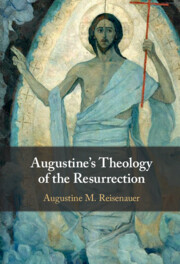Book contents
- Augustine’s Theology of the Resurrection
- Augustine’s Theology of the Resurrection
- Copyright page
- Dedication
- Contents
- Acknowledgments
- Abbreviations
- Approximate Dates
- Introduction
- I Early Considerations of the Resurrection
- II The Resurrection of Jesus Christ
- 4 The Enduring Reality of Christ’s Resurrected Flesh
- 5 The Encounter with Christ’s Resurrected Flesh
- 6 The Sacramentality and Exemplarity of Christ’s Resurrected Flesh
- III The Resurrectionof the Human Spirit
- IV The Resurrection of Human Flesh
- Bibliography
- Index
4 - The Enduring Reality of Christ’s Resurrected Flesh
from II - The Resurrection of Jesus Christ
Published online by Cambridge University Press: 21 April 2023
- Augustine’s Theology of the Resurrection
- Augustine’s Theology of the Resurrection
- Copyright page
- Dedication
- Contents
- Acknowledgments
- Abbreviations
- Approximate Dates
- Introduction
- I Early Considerations of the Resurrection
- II The Resurrection of Jesus Christ
- 4 The Enduring Reality of Christ’s Resurrected Flesh
- 5 The Encounter with Christ’s Resurrected Flesh
- 6 The Sacramentality and Exemplarity of Christ’s Resurrected Flesh
- III The Resurrectionof the Human Spirit
- IV The Resurrection of Human Flesh
- Bibliography
- Index
Summary
Chapter 4 argues that Augustine reaches a theologically coherent articulation of the resurrection in Contra Faustum Manicheum. At this culminating moment, Augustine defends human flesh and its resurrection against the Manichaean repudiations of both. Despite the Manichaean claim to promote the spiritual resurrection, Augustine diagnoses their mental captivity within their ideological constructs of an alternative reality and of a phantom and deceptive Christ as deriving from their disbelief in Christ’s true flesh and fleshly resurrection. Augustine shows how the risen Jesus and Scripture testify to the enduring substance of the flesh in its resurrection, whereby God vindicates his creation and accomplishes our salvation. Augustine progresses to a more sophisticated reading of key scriptural verses by distinguishing between the flesh’s substantial constitution and its qualitative conditions of corruption and incorruption. Moreover, in elevating believers’ hope and by transfiguring their sacraments, Christ’s fleshly resurrection has advanced them towards the kingdom of God.
Keywords
- Type
- Chapter
- Information
- Augustine's Theology of the Resurrection , pp. 75 - 86Publisher: Cambridge University PressPrint publication year: 2023

